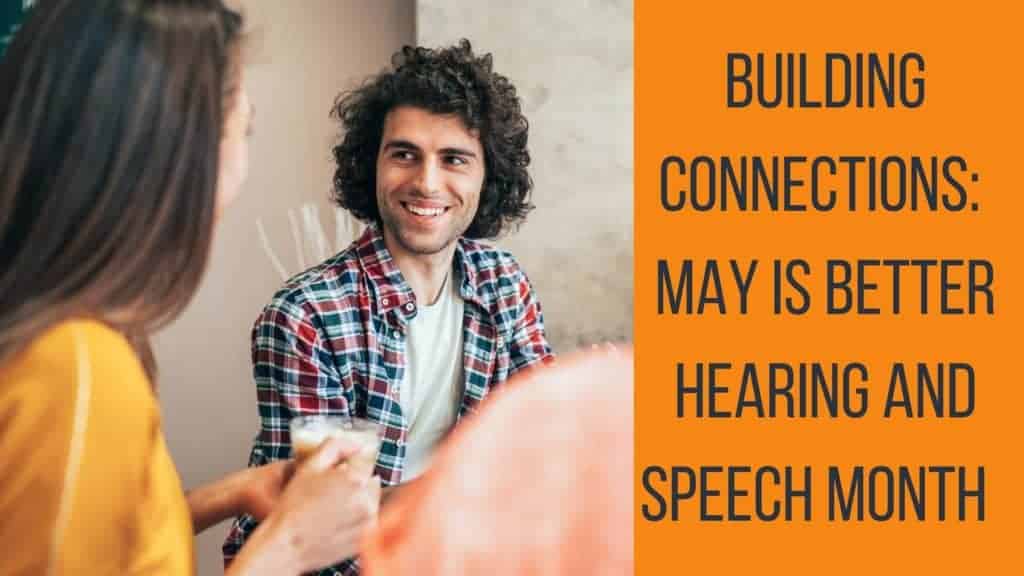
- A Step-by-Step Look at How Hearing Aids Make Sounds Sharper - May 5, 2025
- Causes of Conductive Hearing Loss? - April 27, 2025
- Can Treating Hearing Loss Reduce Stress? - April 15, 2025
Connections with our communities come in many shapes and sizes. In some cases, we connect over shared interests or common bonds. In other cases, we connect through our differences. For over a century, sociologists have pondered these different ways that our communities work together. Indeed, the things we share, such as culture, language, tastes, morals, and beliefs, can bring us together through a common identity. However, our complimentary traits make it possible to work together and achieve a shared goal, as well. By using our strengths side-by-side, we can achieve more than any individual would be able to do alone.
Each May, the American Speech-Language-Hearing Association celebrates Better Hearing and Speech Month, and this year’s theme is “Building Connections.” When we consider the different ways that we connect with others, these two types of social bonds are a helpful way to consider what holds us together. In both cases, communication is the key to establishing similarities and differences. Let’s take a look at the way that verbal communication makes our social connections possible, as well as the toll that hearing loss can impose on these bonds. Receiving treatment for hearing loss is a powerful way to restore the bonds between ourselves and our communities.
Bonding through Similarity
The French sociologist Émile Durkheim described these two ways that people can connect with one another. In the first case, he used the term “mechanical solidarity” to describe our connections through similarity. When we have shared values or beliefs, we can recognize a piece of ourselves in others, making it possible to form community bonds and to share resources. Language is a crucial way that we establish similarities, and you might notice that ethnic and national groups tend to have a common language to define the things they share. Each language holds keys to the deeply held beliefs and values of the group, and some words cannot be perfectly translated from one group to the next due to these unique features. Although written and other forms of communication can establish these bonds, as well, verbal communication is the most powerful way to demonstrate shared values. When we describe our innermost feelings and convictions, we can see ourselves in others. On the contrary, when obstacles make it difficult to communicate, we can also feel a lack of connection and in some cases misunderstandings can arise.
Bonding through Differences
Although it seems counterintuitive, our differences are another way to form community bonds. Durkheim uses the term “organic solidarity” to describe these bonds. Just like the organs of a body, we each have a unique part to play in the big picture of social progress. These differences might have to do with our special skills and talents. If every person were an architect, then who would be the carpenter? Our differences also have to do with our interests and what makes us feel like we have something to offer to the group. Artists might not put food on the table, but they can provide beauty that the farmer can enjoy, as well.
In a more fundamental sense, group dynamics can demonstrate who will be a vocal leader, who will organize things, who can mediate disputes, and who will come up with the big ideas. These differences are expressed through communication, just like our similarities are. When we demonstrate to others where our interests and talents lie, others can coordinate to make the community survive and thrive. In this case, as well, hearing loss can limit our ability to coordinate actions. In any group, we arrange ourselves into roles that coordinate, and verbal communication establishes quite quickly how these connections work best. Hearing loss can be an obstacle in the way of the efficient functioning of the group.
The good news is that hearing loss does not need to form a permanent obstacle to our community connections. Getting treatment for hearing loss can build a bridge where communication once was broken. This May, why not celebrate Better Hearing and Speech Month by scheduling a hearing test with our hearing health professionals. We can provide a thorough diagnosis and connect you with the assistance you need to build strong connections with your community.
